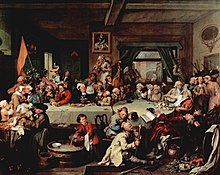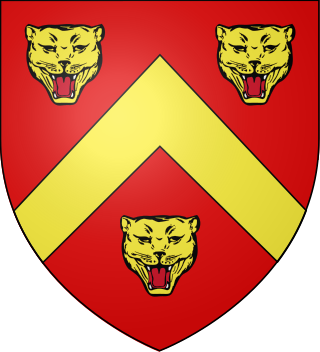
George Parker, 2nd Earl of Macclesfield, FRS was an English peer and astronomer.
Wigtown Burghs, also known as Wigton Burghs,. was a constituency of the House of Commons of the Parliament of Great Britain from 1708 to 1800 and of the House of Commons of the Parliament of the United Kingdom from 1801 to 1885. It was represented by one Member of Parliament (MP).
Cornwall is a former county constituency covering the county of Cornwall, in the South West of England. It was a constituency of the House of Commons of England then of the House of Commons of Great Britain from 1707 to 1800 and of the House of Commons of the United Kingdom from 1801 to 1832. It was represented by two Knights of the Shire, elected by the bloc vote system.
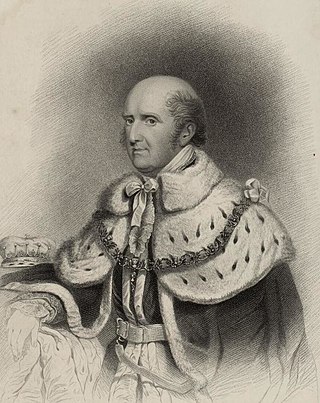
Henry Nevill, 2nd Earl of Abergavenny, KT was a British peer, styled Hon. Henry Nevill until 1784 and Viscount Nevill from 1784 to 1785.
Wallingford was a parliamentary constituency in England, represented in the House of Commons of the Parliament of England until 1707, then of the Parliament of Great Britain from 1707 to 1800 and of the Parliament of the United Kingdom from 1801 to 1885.
The 1768 British general election returned members to serve in the House of Commons of the 13th Parliament of Great Britain to be held, after the merger of the Parliament of England and the Parliament of Scotland in 1707.
The 1761 British general election returned members to serve in the House of Commons of the 12th Parliament of Great Britain to be summoned, after the merger of the Parliament of England and the Parliament of Scotland in 1707. This was the first Parliament chosen after the accession to the throne of King George III. It was also the first election after George III had lifted the conventional proscription on the employment of Tories in government. The King prevented the Prime Minister, the Duke of Newcastle, from using public money to fund the election of Whig candidates, but Newcastle instead simply used his private fortune to ensure that his ministry gained a comfortable majority.
Bristol was a two-member constituency, used to elect members to the House of Commons in the Parliaments of England, Great Britain (1707–1800), and the United Kingdom. The constituency existed until Bristol was divided into single member constituencies in 1885.
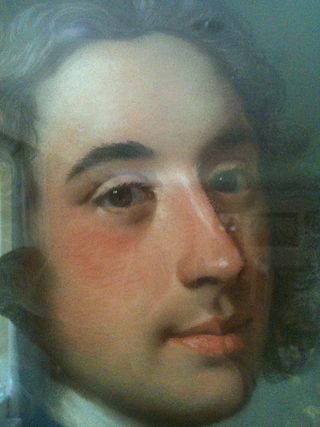
Charles Fane, 2nd Viscount Fane was a landowner in Ireland and England, a Whig Member of Parliament and the British Resident in Florence.
Liskeard was a parliamentary borough in Cornwall, which elected two Members of Parliament (MPs) to the House of Commons from 1295 until 1832, and then one member from 1832 until 1885. The constituency was abolished by the Redistribution of Seats Act 1885.
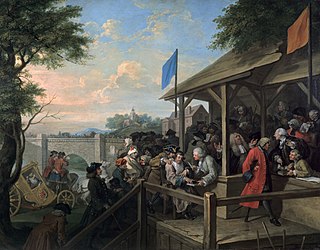
Oxfordshire was a county constituency of the House of Commons of the Parliament of England then of the Parliament of Great Britain from 1707 to 1800 and of the Parliament of the United Kingdom from 1801 to 1885. It was represented by two Members of Parliament. In 1832 this was increased to three Members of Parliament. The constituency was abolished in 1885, being split into three single member divisions.
Norfolk was a County constituency of the House of Commons of the Parliament of England from 1290 to 1707, then of the Parliament of Great Britain from 1707 to 1800 and of the Parliament of the United Kingdom from 1801 to 1832. It was represented by two Members of Parliament. In 1832 the county was divided for parliamentary purposes into two new two member divisions – East Norfolk and West Norfolk.
Sir Edward Turner, 2nd Baronet was one of the Turner baronets of Ambrosden and a Member of Parliament.
Philip Wenman, 6th Viscount Wenman, was a British landowner and politician.

The 1754 Taunton by-election to the Parliament of Great Britain was held across thirteen days, from 10–24 December 1754 in Taunton, the county town of the southwestern English county of Somerset. It took place following the death of the incumbent Whig Member of Parliament, John Halliday. The by-election was contested by Robert Maxwell on behalf of the Whigs, and Sir John Pole, 5th Baronet for the Tories. Maxwell was elected with a majority of 56. The election had over 700 rejected votes, and the result caused rioting in Taunton, during which two people were killed.

Sir James Dashwood, 2nd Baronet was an English politician who sat in the House of Commons from 1740 to 1768.
Gabriel Roberts of Ampthill, Bedfordshire, was an official of the East India Company and politician who sat in the House of Commons between 1713 and 1734.
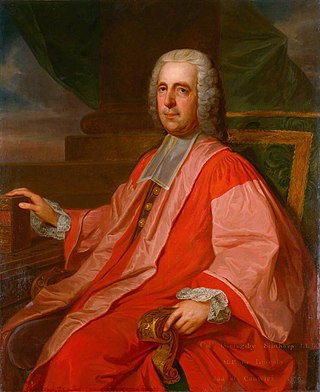
Coningsby Sibthorp DCL was an English Tory politician who sat in the House of Commons for the borough seat of Lincoln on variously between 1741 and 1768. Sibthorp was a member of the Sibthorp family of Canwick Hall in Lincolnshire which produced several Tory Members of Parliament between the early 18th-century and mid 19th-century, in addition to several botanists. Like the vast majority of Tory Members of Parliament during the Whig supremacy Sibthorp never held ministerial office, maintaining his political independence and Tory principles throughout his political career. On one occasion, however, Sibthorp did serve as the High Sheriff of Lincolnshire.
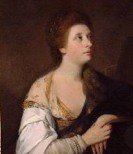
Susanna Keck born Lady Susan Hamilton was a British political manager. She sided with the whigs and she took a strong interest in the 1754 general election in Oxfordshire.
